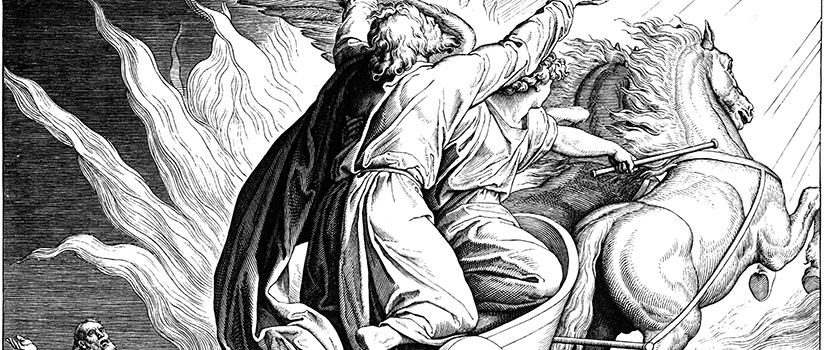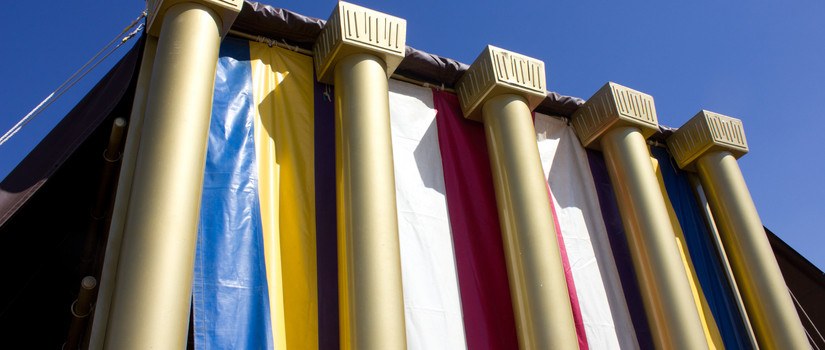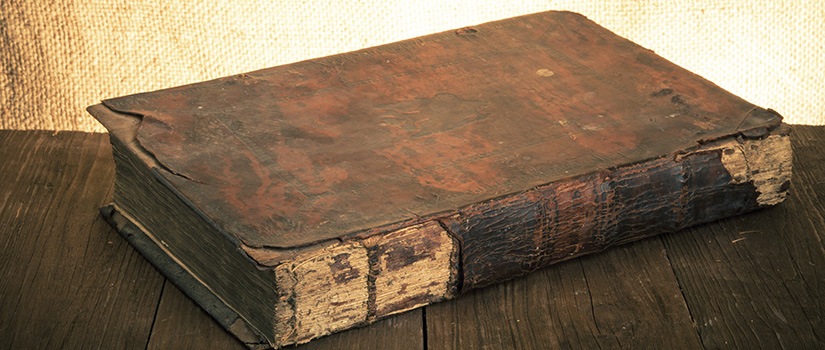Elijah And The God Of Ekron #7
This study of the life of Elijah begins after the account of Ahab’s death and burial, and the manner in which the dogs of Samaria fulfilled the prophecy of Elijah. (1 Kings 22:37-38)
2 Kings 1:40. So Ahab slept with his fathers; and Ahaziah his son reigned in his stead.
~~~~~ Contents ~~~~~~
1. Ahab’s Influence Lives On In His Son.
2. Judgment Mingled With Mercy.
3. God Calls Ahaziah To Give Account.
4. Elijah, Minister Of Vengeance.
5. A Description Of Elijah.
6. Ahaziah Shows His Arrogance.
7. The Third Captain Pleads For His Life.
8. Elijah Enters The City Of Samaria.
9. A Memorial Scene.
10. Elijah’s Last Message To The House Of Ahab.
1. We Will See How The Influence Of A Person Lives On Long After Death:
1. First this was legally true, that Ahab survived in Ahaziah. In law a man is said to “live in his heirs.” He is never fully dead while he has an heir. There is good reason for this. Ahaziah would never have mounted the throne of Israel unless his father had been there before him. He reigned in the posthumous influence of Ahab. Ahaziah was indebted to his father Ahab for the circumstances which he inherited.
1 Kings 1:40. Ahaziah the son of Ahab began to reign over Israel in Samaria the seventeenth year of Jehoshaphat king of Judah, and reigned two years over Israel.
52. And he did evil in the sight of the LORD, and walked in the way of his father, and in the way of his mother, and in the way of Jeroboam the son of Nebat, who made Israel to sin:
53. For he served Baal, and worshipped him, and provoked to anger the LORD God of Israel, according to all that his father had done.
2. Second Ahaziah inherited the moral influences and nature of his father Ahab, and thus Ahab lived on in his son Ahaziah. The bad example of his father wrought its influence into his character, and thus Ahab survived in Ahaziah. In Ahaziah the vices of Ahab and Jezebel, his father and mother, were reproduced.
It is a notable truth that men have influences in spite of themselves, and that these also are posthumous. It would be well for every parent to take note of this truth as their moral influence upon their children will certainly outlive them and be reproduced in them.
Ahaziah should have been admonished by the history of the judgments of God upon the house of Jeroboam. (2 Chronicles 13:15-20) He should have taken the warning given In the judgments of God on the sins of his father. He possibly was present, along with Jehu and Bidkar, in Naboth’s vineyard when Elijah pronounced judgment upon his Father (2 Kings 9:25-26), and most likely at Mount Carmel. (1 Kings 18:20-46). His guilt, therefore, was upon his own head, and he suffered accordingly. He reigned two years (1 Kings 22:51). God makes short work with some sinners.
2. Judgment Mingled With Mercy:
Ahaziah’s death was provoked by his perversity. This we will find as we continue the narrative in 2 Kings 1:1.
At this late date it is impossible to determine how the book came to be divided at this particular point. The division is most unfortunate. It separates what was evidently the intention of the writer to closely connect the sins of Ahaziah and the unfortunate accident which happened to him as a punishment from God. The story that follows involves one of the most remarkable of the miracles of Elijah’s ministry.
2 Kings 1:1 Then Moab rebelled against Israel after the death of Ahab.
Probably as soon as they heard about the death of Ahab Moab rebelled against the yoke of bondage that David had placed them under (2 Samuel 8:2). This First Stroke was part of the punishment God sent upon Ahaziah for his evil ways. The Second Stroke followed shortly, and was personal. It was permitted that an accident should befall him.
2 Kings 1:2. And Ahaziah fell down through a lattice in his upper chamber that was in Samaria, and was sick: and he sent messengers, and said unto them, Go, enquire of Baalzebub the god of Ekron whether I shall recover of this disease.
Ahaziah was standing in an upper chamber which had a latticed window, opening out, probably on a garden. He was rashly leaning against it when the fastening or woodwork gave way and he fell to the courtyard beneath. The injury was serious and forced him to take to his bed where he lay, probably in much pain and discomfort.
Ahaziah was alarmed about this sickness, because he was afraid of death, and he wanted to know if he would recover. Nothing happens by chance, and “the curse causeless shall not come” (Proverbs 26:2). Therefore the king’s duty was to fast and pray and try to find out what it was that displeased the Lord God of Israel. Here was judgment mingled with mercy. Here was where, “space for repentance” (Revelation 2:21), was granted the idolatrous King. Judgment mingled with mercy.
O how long-suffering is God! Ahaziah’s fall did not prove immediately fatal, though it placed him on a bed of sickness where he had opportunity to “consider his ways” (Haggai 1:5, 7). How often the Lord deals thus, both with Nations, and with individuals.
Many a blatant rebel has been pulled up suddenly in his evil career. An accident, a terrible illness, cancer, heart attack, overtook him, though it may have deprived him of limb, or laid him on a bed, but not yet his life. This is judgment mingled with mercy.
Such may have been the experience of someone who reads these lines. If so, we would say to them with all earnestness, redeem the time that is left you. You might now, but by the mercy of God, be in Hell, but God has given you a further season (brief at the most) to think of Eternity and prepare for it. Allow the goodness of God to lead you to repentance (Romans 2:4).
2 Kings 1:2b. ….. and he (Ahaziah) sent messengers, and said unto them, Go, enquire of Baalzebub the god of Ekron whether I shall recover of this disease.
There was no turning to the Lord for guidance and help; there was no humbling of himself before God. Ahaziah had forsaken the Lord when in health, and could have reformed his life and the life of his Country, and he does not think that God will hear him now. Or, perhaps, he has been so hardened in sin that he really believes his heathen god can help him.
Believing that the idol at Ekron could foresee and foretell things to come Ahaziah paid him homage. The exceeding sinfulness of such practices is placed beyond dispute by such passages as, Leviticus 20:6, 27; Deuteronomy 18:10; and, 1 Chronicles 10:13). Thus those who consult fortune-tellers, astrologers, and spiritualist, are guilty of a fearful sin, and expose themselves unto the powers of evil.
3. God Calls Ahaziah To Give Account:
Nothing escapes the observation of him with who we have to do. His eyes are ever upon the ways of men, whether they be monarchs or servants. None are too high or independent to be above his control, and none are too low or insignificant to be overlooked by him.
This action of Ahaziah was a deliberate and public rejection of the Lord, and it did not go unnoticed by Him. And He, ho is King of Kings, as well as the God of Israel, calls him to answer for his actions.
2 Kings 1:3a. But the angel of the LORD…
The Angel of the Lord, is a temporary manifestation of God, and here, as in many other occasions, is the medium by which the Word of the Lord is given to the Prophet. Even though God is a Spirit, and inhabits, and fills, the entire universe, He can, and does, appear to the eyesight of his creatures, at His discretion.
2 Kings 1:3b. … said to Elijah the Tishbite, Arise, go up to meet the messengers of the king of Samaria, and say unto them, Is it not because there is not a God in Israel, that ye go to enquire of Baalzebub the god of Ekron?
4. Now therefore thus saith the LORD, Thou shalt not come down from that bed on which thou art gone up, but shalt surely die. And Elijah departed. (KJV)
Elijah is called once more, and for the last time Elijah is commissioned to do the work of a Prophet. The word “Therefore,” is emphatic and means, “for this reason,” “on this account.” Because Ahaziah had apostatized from God, God sentenced Him to die from the effects of his fall, and not recover. It is implied that he might have recovered if he had acted otherwise.
4. Elijah The Minister Of Vengeance:
2 Kings 1:4b. And Elijah departed.
So Elijah is called upon to meet the messengers as they went speeding on their way from Samaria to Ekron. Elijah met the messengers as God had directed, and delivered God’s message for them to take back to the king.
When the messengers encountered Elijah they were so impressed by that commanding figure and his authoritative voice, and so awed by his knowledge of their mission, and so terrified by his message for the King that they returned at once to the king.
This illustrates to us that when a servant of God is energized by an invigorate Spirit, his message carries conviction and strikes terror into the hearts of his hearers. Just as Herod “feared” John the Baptist (Mark 6:20), and Felix “trembled” before Paul (Acts 24:25), these messengers were conscripted into service by the anointed Elijah.
But it is not talking to the wicked about the Love of God which will produce such effects, nor will such conscience-soothers be owned in Heaven. Rather it is those who declare, as Elijah to Ahaziah, “Thou shalt surely die.” (2 Kings 1:6)
2 Kings 1:5. And when the messengers turned back unto him, he (Ahaziah) said unto them, Why are ye now turned back?
They responded (2 Kings 1:6) by giving the king the message Elijah had told them to give him. They delivered a plain straight forward account. Ahaziah asked them “what kind of man was he?” “What did he look like?” “What was he wearing?” “Describe him to me.”
No Doubt Ahaziah was convinced as to who it was that had dared to cross their path and send him such a message, even though it had been several years since he had seen or heard from Elijah. The last time he had appeared in public was when his father, Ahab, had met him in Naboth’s vineyard.
5. A Description Of Elijah:
Then the messengers gives us the only description we have of Elijah in the Bible.
2 Kings 1:8. And they answered him, He was an hairy man, and girt with a girdle of leather about his loins. And he said, It is Elijah the Tishbite.
The description given is enough. The King has no longer any doubt. His suspicion is turned to certainty. Ahaziah was no doubt at Carmel and had a lingering remembrance of this hairy man.
He probably was with his father, Ahab, in Naboth’s Vineyard and remembered the terrible sight and sound of this man clothed with leather skins. “It is Elijah the Tisbite,” no one else would have the audacity to send such as message.
Ahaziah thinks, like his father Ahab, that Elijah is, of course, his enemy (1 Kings 21:20), and will wish him ill, and prophesy accordingly.
Elijah may have withdrawn himself into the wilds at the death of Ahab, and not have shown himself for these two years (1 Kings 22:51) that Ahaziah had been king. Ahaziah May Have Been Longing To Arrest Elijah And Imprison Him, Or Even Slay Him, And Now Thought He Saw His Opportunity.
Such a terrible sentence, “thou shalt surely die,” had not brought Ahaziah to his senses. He does not begin to set his house in order (Isaiah 38:1). He does not prepare to meet his God as a guilty but penitent sinner, but is filled with anger and defiance.
6. Ahaziah Shows His Arrogance:
Ahaziah was young and arrogant, like his mother Jezebel, and not at all disposed to receive reproof or endure opposition to his will, no matter from whence it came, no, not even from Jehovah Himself. He will use force of arms to bring the prophet in. And he figured fifty armed and trained soldiers should be sufficient to apprehend Him.
Ahaziah was at no loss to find fifty wicked men ready to execute the most desperate of impious orders. This company of soldiers went forth promptly to lay hold of the Lord’s servant. They quickly found him sitting on top of hill.
Let us note the spirit of the captain, which shows his heart was thoroughly in his task, for he insolently addressed Elijah as “Thou man of God” (2 Kings 1:9), which was by way of derision and insult. It was as though he had said, “thou claimest Jehovah as thy master, we come to thee in the name of a greater than He: “King Ahaziah says, come down.”
This same spirit confronted our Lord a thousand years later, “If thou be the son of God, command these stones to be made bread.” (Matthew 4:3)
7. Elijah’s God Answered Arrogance With Fire:
2 Kings 1:10 And Elijah answered and said to the captain of fifty, If I be a man of God, then let fire come down from heaven, and consume thee and thy fifty. And there came down fire from heaven, and consumed him and his fifty
It was not only an insult to Elijah, but to Elijah’s God, an insult which was not allowed to go unpunished. Elijah could but pray to Jehovah (2 Kings 1:10), and Jehovah, in His Wisdom and Perfect Goodness, would either grant or refuse his prayer. Elijah had no power of himself to do either good or evil. And if his prayer was granted, the punishment inflicted would not be Elijah’s work but God’s. To tax Elijah with cruelty is to involve God in the charge.
Many have attempted to alter the translation in order to soften the charges of cruelty and bloodletting that have been leveled at Elijah. But there is no doubt that Elijah “commanded fire to come down from heaven” (Luke 9:54), or, in other words prayed to God that it might come down, and in answer to his prayer the fire fell and consumed the fifty armed soldiers. (2 Kings 1:10)
We must judge Elijah, not by the ideas of our own day, but by those of the age when He lived. Elijah was raised up to vindicate God’s honor, to check and punish idolatry, to keep alive a faithful remnant in Israel, when all the powers of the earth were joined together to destroy and smother true religion. Elijah was an embodiment of the Law, of absolute, strict, severe justice. The fair face of mercy was not revealed to him, but came through Jesus Christ.
God regarded it as a fitting time for making an example, and saw fit to answer accordingly. The judgment was in accordance with the general tone and tenor of the Law which assigns “tribulation and anguish to every soul of man that doeth evil” (Romans 2:9). And under the Law visits with death every act of rebellion.
The spirit of the Law was strict, stern, inexorable justice. The Law pronounced curses on law-breakers, vindication on those who inflicted pain and suffering, “eye for an eye, tooth for tooth, hand for hand, foot for foot, burning for burning, wound for wound, stripe for stripe” (Exodus 21:24-25), “death for death” (Exodus 21:12).
Man was so far gone from original righteousness, had so corrupted and depraved himself that only by the strictest possible system, by the most solemn warnings, the most awful threats, and the sternest possible execution of these threats, could wickedness be repressed, mankind be reclaimed, society saved.
That’s the reason for the severity of the Mosaic Code and the frequency of the penalty by death. And that’s why fire fell from Heaven on the troupe of soldiers that the wicked king Ahaziah Sent to apprehend Elijah. Josephus says that the “fire” was a flash of lightening and so I would generally agree.
2 Kings 1:11. Again also he sent unto him another captain of fifty with his fifty. And he answered and said unto him, O man of God, thus hath the king said, Come down quickly. (King Ahaziah Has Grown Impatient)
12. And Elijah answered and said unto them, If I be a man of God, let fire come down from heaven, and consume thee and thy fifty. And the fire of God came down from heaven, and consumed him and his fifty.









